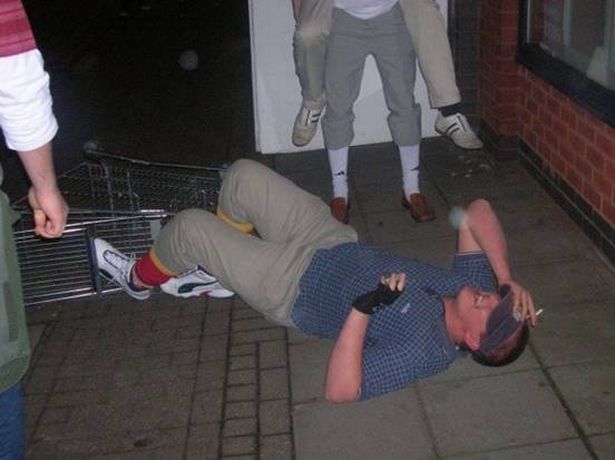We’ve all experienced lads at some point in our lives. Men who specialise in crap banter, downing pints, public nudity, getting into fights and generally treating women like dirt.
Images VIA
It’s not a good group to be a part of, something that Chris Hemmings agrees with. Hemmings used to be a lad himself and was involved in disgraceful antics at university. Now he is seeking to overthrow this culture and has started with speaking to the Mirror to share his story. Here goes:
As a rugby fresher, you are at the behest of the senior members of the club. Refusal to play by their rules once or twice means a severe forfeit or punishment – permanent refusal means being unable to socialise with your teammates.
So, for the first 12 months, and for reasons I still can’t bring myself to understand, I allowed my actions to be determined by the will of 40 men who all happened to have been at the university slightly longer than me.
From then on my first year came to be nothing more than a constant battle to prove how macho I really was.
It was always about proving something to the group. My ability to drink more than the others, to have more sex or to be more outrageous.

If you think masculinity has nothing to do with it, how about the time I was in the pub with some female friends and was forced to put myself on display for them.
I was told it wasn’t acceptable for me to be ‘hanging out with birds’, was forced to drop my trousers and stand next to some of the well-endowed seniors who had found me, and then made to drink pint after pint until they were satisfied I was drunk enough I could no longer socialise with my friends.
Not only was there a constant battle for supremacy in everything we did, there was no concept of nurturing or caring for anyone.
On tour I fell ill with acute tonsillitis, a condition I’d regular suffered from, only to be made to drink washing-up liquid for ‘being wet’ and refusing to participate in the end-of-tour ‘lash’.
The behaviour of this group of men grew increasingly abhorrent and it quickly began to affect those outside the club.
Not only did we share naked videos of the women our club mates had slept with and start fights with anyone who dared to cross us, we did it in the full knowledge that we could act with an almost utter impunity towards everyone else on campus.
Take, for example, the only time I can recall our rugby team being disciplined. During one night some members of the team took it upon themselves to insult some members of the LGBT sports community.
As a form of retribution, we were all forced to wear t-shirts bearing the ludicrous slogan ‘homophobia is gay’ on our next club social.
Instead of treating this as a serious punishment, the entire team dressed up in drag, got blind drunk and spent the whole night acting out homoerotic scenes to the great amusement of each other.
The university did nothing to stop us because, well, ‘boys will be boys’, right?
But this was lad culture at its most pervasive, and the longer our actions went unchallenged, the more disgusting they became.
One game that became increasingly popular during my first year was called ‘Hot Leg’. The rules were simple: find a girl in a club, get her to dance with you then, when she’s grinding on your legs, you piss on hers.
The aim of the game was to piss as long as possible until she noticed. Then, once she was enraged, to try and hold on to her. All the time, still pissing.
This was just one of a whole host of activities that took our behaviour beyond the light-hearted. It was the ritual humiliation of women, something that was ever-present in the way we acted day in, day out.
I can honestly say I never pissed on a girl, but I stood idly by as others participated or laughed along with those who did.
I didn’t have the guts to question what was taking place or to say no, as the fear of social rejection or punishment was too great.

That is my biggest shame. My frame of mind was trained solely on proving my masculinity. I couldn’t disassociate myself from the group, and didn’t allow myself to empathise with those we were affecting.
That was until mid-2006.
On this occasion the order from the seniors was clear: if any ‘bird’ was to enter our room, I was to pour a drink over her head. I’d both seen and done this numerous times before, each time receiving the adulation I felt fully deserving of.
Only this time was different. This time my friend Holly was looking for her friend’s birthday party within the student union. She was dressed up as one does for a party, and was about to enter the wrong room.
The fact she was a friend changed everything. I turned to the group and, not then understanding the rank double-standards of my words, protested about having to pour my drink over someone I knew.
To no avail.So, reluctantly, I mouthed ‘sorry’ and covered her in purple booze.
She was understandably furious, but before her seething fury was allowed to turn in to full blown rage, she looked up to see forty shirtless men chanting, laughing and high-fiving at her expense.
She was powerless to react, and quickly left the room holding back her tears.
Out of sheer embarrassment and cowardice I didn’t speak to Holly again until second year. I’d even actively avoid her on nights out or in and around campus.
Then, one day, she told me how I’d made her feel that night, explaining not only how I’d ruined her clothes and her evening, but also how degrading it was to be mocked by a room full of lads when she’d basically been attacked.
Coincidentally, just weeks before Holly confronted me, I’d tried for the first time to adopt the bullying persona expected of me as second year.
I’d taken aim at a fresher who’d clearly lost a huge amount of weight and had excess skin around his midriff.
Once the new intake were inevitably told to get naked I mocked his loose-hanging skin, pointing it out for all to see.
But seeing the distress I was causing him turned a lightbulb on in my brain, and I slowly began to extricate myself from the fresher-baiting.
It was then I first began to question my why we felt entitled to act in this manner. To question why we allowed ourselves to treat men and women so disgracefully. And to question why we did it without even the slightest inkling of remorse.
It took me ten years to full understand why I’d become the awful person I was at university and I’ve slowly began to understand how that macho culture can continue to affect us as we grow older.
It’s apparent in the awful violence and sexual assault statistics, the often-quoted male suicide rates, our propensity for alcohol addiction and much, much more.
For me, it became apparent after the death of my father in 2013. My emotional illiteracy meant I spent three months desperately avoiding reality via drink and drugs – and it was only as I was on the brink of a meltdown that I recognised my flaws once again.
And so, my book ‘Be A Man – How macho culture damages us and how to escape it’ is my gift to the next generation. To help them avoid making the same mistakes I did.
To let them know there is an alternative, and that they can be the ones who say no.
Men like me have to take responsibility for our previous actions.
We have to recognise that we must be the ones to share our experiences with today’s young men.
And we have to ensure we all grow up in a world where lad culture in all its many guises can no longer survive.
As said, I have seen these types of people out and about, but I didn’t realise quite how extreme the abuse goes. For what they consider to be “banter” is bordering on illegal and the lack of emotion only seems to be fuelled by a need to outdo one another. Hats off to Hemming for realising his mistakes, making a change and actually using his experiences to put an end to the progression of lad culture. The banter has to end some time.
For pictures of the ultimate lad tourist destination, Magaluf, click HERE.















